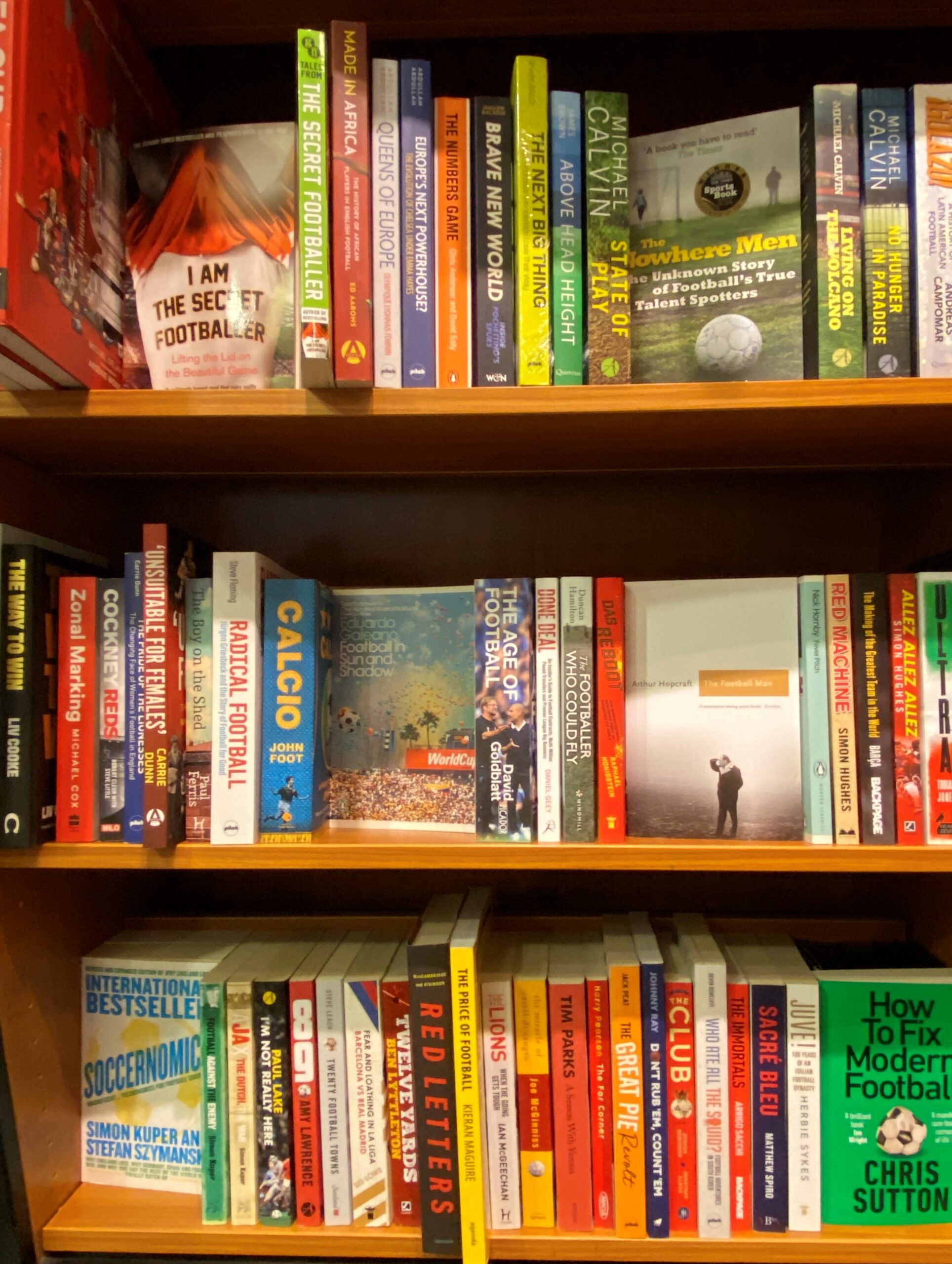How to get a job in football - top tips
How do I get a job in football?
Getting a job in football as a data or video analyst is much more achievable than you might think.
There are more and more job posted from more clubs and organisations being advertised than ever both, but the competition is fierce!
The good thing is that the jobs are being advertised and in places that you will be able to view. Clubs and organisations are now advertising on their own websites, job platforms and on social media platforms like Twitter, LinkedIn and Facebook.
Clubs and organisations want to attract the best talent to work with them and you don’t always need to have a background in football. There is a huge number of career paths now available within football and sport – you just need to take some time to look at all of the range of jobs available.
If you are interested in working in the football sector take some time to look at the whole raft of jobs that are available. You might not have thought about the jobs that are available to you and your first job might not be your dream role but it will give you experience of the sector and possibly that foot in the door!
You no longer need to know ex-players or have a network of contacts within a club to get a chance to work in football. In this article we’ve spoken to people who are working in many different roles across the world to get their top tips.
Take time to read how they got their break and see if you can apply their advice to your on applications and job search!
Remember that the jobs are out there and there is more than just the top 4 clubs looking for people to come and work with them.
Good luck!
Top Tips From People Working In Football
Paul Golah
Sales Enablement at SportRadar
Under 14 Girls Lead Coach at QPR
My top tip would be CV design: from personal experience I got many more responses when I altered the layout of my CV to be more colourful, more unique and highlighted key skills/experiences in bold that were directly linked to the job description of what I’d gone for. Think this can be an effective way to stand out from the dozens/hundreds of other applications.
Lee Fraser
England Women’s Physical Performance Analyst
I think when applying for a role preparing for interview it is extremely relevant to take a detailed look at the clubs current squad and also what is below (u23s)
Danny Barham
Professional Development Phase Coach at Birmingham City FC
It’s about adding value..research the club/department that you want to work in and find an area of their working processes that you can improve for them.
Guido Buziak M.Sc.
FIFA Licensed Agent – Professional Goalkeeper (Eredivisie)
I see three main categories where there are jobs opportunities
1) Professional football players
2) Professional football coaches
3) Football professionals – a wide range of different professions: (performance/media/data/…) analyst, nutritionist, marketeer, etc.
The first two are obvious (with women’s football as a growth market).
The third includes areas that more people can contribute to including areas like performance enhancement and/or fan engagement. The actual work may vary, especially over time, as technology and science advance.
(Elite) players are more and more organising their own staff. They develop their own team and it matches their needs due to the fact that they build a long-term relationship with people they trust and can rely on. When a player moves to another club and/or a new coaching staff is in charge, they keep their contacts and support.
So for an analyst, it might be better (continuity, satisfaction) to work directly for a player or coach, instead of working for a club.
This development is also what we as Worldclass.Football (group of former elite players, coaches and player agents) are focussing on. To organize success, to support players and coaches with the best possible people, routines and tools so they can get the most out of their talent.
Alex Paden
Managing Consultant at Energize Group
Academy Performance Analyst Liverpool FC, First Team Performance Analyst, Blackburn FC
I’d definitely say building and utilising your network – all my roles came through having a network rather than seeing a job ad, applying, then being offered an interview.
Marco Savino
Founder & CEO at Iterpro
My honest advice is to make sure to develop some skills/knowledge for the first 2-3 years at least and be ready to join internship programs in football companies/clubs.
The best would be to have some experience on the pitch (club) and sports tech (tech provider), so the intern can see both sides of the moon, trying to make as many experiences as possible.
I believe from there, the pathway will be clearer, we saw this with our interns but also with myself when I started 15 years ago.
Yannick Herkommer
VFB Stuggart
Co-Trainer Analyse U17 bei VfB Stuttgart
I think it’s essential to get the best possible qualifications. What does that look like in concrete terms? On the one hand, there are many websites (like your website) that help you to develop your skills – on the other hand, I always found it super valuable to have personal exchange. My experience shows me that the game analysts are usually totally open and it’s easy to get into a dialogue.
Mia Eriksson
Women’s football writer ✍️ TV4 and Fotbollskanalen | Content creator football analysis and tactics for PlaymakerAI | 🎙️ Their Pitch podcast | Communication strategist Linköpings kommun
The best tip I can give someone is finding something that they can build their own brand with
People tend to do too much, if that makes sense and they are all over the industry instead of building their personal brand with a certain focus
Do YOUR thing and try to figure out what the industry needs to grow with your help, not the other way around
Jake Toyer
Academy Analyst at Peterborough United | FIFA Tournament Football Analyst
It is really important to build a strong network and learn from others around you.
Lewis Roberts
Performance Analyst at Tottenham Hotspur
In an incredibly competitive industry, try and differentiate yourself and your CV from the rest. Whether that’s gaining experience in different roles or attending courses that will give you additional qualifications. Ask the question, what makes me better than the other 100 people applying for the role?
Tom Fry
Technical Scout at Port Vale FC and Founder of TF Scouting and Consultancy
My top tip for getting a job in football would be to get volunteer experience and treat it like a paid role.
Asher Hines
First Team Performance Analyst at Ebbsfleet United FC
I’d mainly say having the Perseverance to continue contacting people even when when it may seem hopless at times and having a determined and patient mindset to stay focused on your goal i.e. achieving a PA role as an intern and or staff.
Head of First Team Scouting
Premier League Club
Always have an example of your best work ready and available to show. If you are sending a CV, I would send that along with it, as the work will capture someone’s attention the most.
Goes without saying that your best work shouldn’t have errors or look sloppy. Attention to detail is so important, so within such a competitive industry, a small mistake can be the difference between getting the job and rejection.
Keep up to date and involved in the aspect of football you want to work in. So if you are from the data side, know the latest metrics and developments. For example, there are so many great people on twitter who post their thoughts and work, so very easy to stay up to speed. Twitter is a great platform for getting your own work out there too.
Similar to the above post, but try and mix with the people you would like to be working with. So for a scouting example, try to get to some games (free entry to Premier League 2 games etc). You might end up speaking to someone in the industry and get a connection that way. Very difficult to do this constantly, with travel costs and time, but if there is something convenient, then it can’t do any harm
Stick with it! It’s a tough industry, but if you keep improving and demonstrating expertise in your field, it will be hard for people to ignore
Anna Masagati
Football Scout
Be patient.
The football industry is highly competitive and it is not easy to get your dream job . Maybe you will have to wait for a longer time than you wished but that’s how things work.
In my case, this means I have to wait maybe longer than other people because many clubs in Africa don’t have enough budgets to hire scouts or analysts. My dream is to work in football full time but I don’t know when this will happen therefore everyday when I wake up I have to remind myself that I shouldn’t stop waiting no matter how long this will take.
Do not be afraid to approach someone for help just because you think you are just a beginner or you are not experienced enough so no one will bother to listen to you. There are many people out there who are willing to help.
Scott McLeod
Everton
It varies based on the role you are going for. If it is in data analysis, it seems it is very much based on having done the right course, so you come with the credentials – and also have demonstrated some pro-active efforts to gain a foothold. Volunteering at lower level clubs for instance, or doing a work placement. The football ops side of football is still very much driven by relationships, and being recommended or coming with an endorsement.
On the business side, having a traceable demonstration of the work you’ve done helps get your foot in the door. LinkedIn testimonials and evidence of an understanding of the business of football.
Rudhra Visvash
Video Scout – Total Football Analysis Pro
Performance Analysis – Cricket
Networking is the key to it all!
Football is a niche industry and has a lot of competition, so talking with experts, maintaining a good rapport and building a portfolio which would be ideal for the role you’re looking at. It certainly does come in handy.
Freelance Football Ops
Our top tip is to create online content. Whether that’s starting a football blog, a TikTok channel or a newsletter. Showcasing your work and passion online for recruiters to see can be a differentiator between yourself and other candidates.
Leon Antonio
Project Manager at Stats Perform
What I would always advise people would be to ensure that they carry themselves with integrity at all times, never get involved in confrontation, and lastly; I’d always recommend never making snap decisions or based off of a reaction. Always be considered and concise in your thought processes and decision making.
Tips for getting a job in football, don’t be too proud to start at the bottom. Don’t hesitate to speak to experienced stakeholders. Try to ask questions and gain an understanding of what the overall strategy and objective is. Then try to ensure you as a person/employee provide value, and are geared towards that strategic objective!
Marc Lamberts
First Team Video Scout at Malmö FF, Writer and Analyst
I think it is very much important to look at the needs of the audience/coaching staff – what do they need and how can facilitate that, rather than thinking what you do is always the right thing
I would say that there is a difference between what’s important in a club and what might work online/in an article
I also think most of it is experiencing and getting experience. No one is going to be an elite analyst or scout in a week. You need to put hard work into it.
Also I think that right now it is important to have both knowledge of video/tactical analysis but certainly also about the data side of it
Sagar Makwana
Wyscout Tagging Manager at Hudl
Football, also known as soccer in some countries, is a passion for millions of people around the world. For many fans, working in football is a dream come true. The good news is that the football industry offers a range of career opportunities, from coaching and player management to marketing and media. However, getting a job in football requires a combination of education, experience, and persistence. In this article, we will explore some tips for how to land your dream job in football.
1. Get a relevant education
2. One way to increase your chances of getting a job in football is to obtain a relevant education. You can study subjects such as sports management, sports science, and business administration. This can provide you with a solid foundation in the skills and knowledge necessary to work in the football industry. Many universities now offer specialized degrees in sports-related fields, and some even have partnerships with football clubs or leagues that offer internship programs.
3. Gain relevant experience
4. Having relevant experience is essential to getting a job in football. You can start by volunteering in a local football club, working as a coach or assistant, or getting involved in community initiatives. This can help you gain valuable experience in football and develop the skills needed to succeed in the industry. Another way to gain experience is by working as an intern or apprentice in a professional football club or league. This can give you exposure to the workings of the industry and help you network with professionals in the field.
5. Build a network
6. Networking is a crucial part of finding a job in football. Attend industry events, conferences, and career fairs to meet people in the field. Make connections with professionals, and ask for advice on how to break into the industry. You can also join online forums or social media groups related to football to connect with others in the field.
7. Be persistent
8. Getting a job in football can be a long and challenging process. Be prepared to face rejection and setbacks, but don’t give up. Keep applying for jobs and opportunities, and continue to develop your skills and knowledge. Persistence and determination can help you stand out from the competition and demonstrate your commitment to the industry.
9. Focus on your strengths
10. Football is a multifaceted industry that requires a range of skills and knowledge. Focus on your strengths and develop them to become an expert in a particular area. This could be coaching, player management, marketing, or analytics. Specializing in a particular field can help you stand out from the competition and increase your chances of finding a job.
In conclusion, getting a job in football requires a combination of education, experience, persistence, networking, and focusing on your strengths. By following these tips, you can increase your chances of breaking into the football industry and turning your passion into a career. Remember to stay dedicated and committed, and eventually, your hard work will pay off.
Jesper Gudde
Head of Scouting at Sparta Rotterdam
Build up your knowledge by meeting professionals in Football and focus on a specific area to become a professional one day.
Bertan Bayrak
Performance Analyst – Paradine
I had talked to a number of clubs and didn’t make any progress. My tip would be to constantly post analysis on certain topics. In this way, the candidate can interact. Also, specialising in a certain subject may bring success in my personal opinion.
My tip to break into the football industry is as follows. Its not an easy one but it’s an effective one, and that will prepare you for life as a scout- lots and lots of work for very little reward!
Simply, get to all the football you can possibly get to, but do it with a purpose. In short, do the job and you’ll get better at the job. But focus it and do it properly:
Matthew Lever
Blackburn Rovers – Senior Scout
1) Pick a club, research and watch them, what do they need/how do they play, go as deep as you can. Pretend (yeah, I know that sounds crazy, but, hey) they’re your employer. The club doesn’t have to be a first team or a league team- you might want to work for your local non-league (go do some opposition analysis on them and get to know them well, you can send these to them in the future).
2) Identify a player who suits that club, what type of player do they need? Study data, research the Internet, talk to your network (even if that’s online contacts or mates). Identify the player and go and scout them as many times as necessary, in video and in person.
3) Write it up each time (there are templates on line, but if not get in touch with me and I’ll send one over) and send it to the club along with a decent cover letter and c.v. If you need a hand with the write up, my book ‘Positional Scouting: a guide to scouting each position on the pitch’ (working title) is due out at the end of the summer.
4) Rinse and repeat, most clubs won’t get back to you 1st or 2nd time. In fact, most will never get back to you, but what are you going to do- give up? It’s great practice anyway.
Ivan Benko – Professional Goalkeeper
My piece of advice will be networking and constantly looking for ways to improve and educate. I think it is the best way to get opportunities in sports(Football).
Andrew Paterson
Programme Leader of Football Business and Marketing @ucfb Wembley Campus
Research…Everyone and everything about the organisation…from key decision makers through to anyone you’d have potential dealing with…know what they do?), when they do it how they do it.
Kishan Fatania
Data Engineer at Aston Villa Football Club
I first heard about the opportunity for my current role via LinkedIn. My advice would be to use LinkedIn to your advantage.
Jobs in football are hard to come by, but following some active voices in the football analytics community on LinkedIn can definitely help make you aware of these opportunities when they arise.
If you are looking for more education about football you can try one of our online courses.
Award-Winning Football Analysis Courses
Our award-winning football analysis courses have been built with the expertise of professional analysts who have worked in top leagues around the world, including the English Premier League, Italy’s Serie A, and America’s MLS. They will teach you how to analyse like a pro.

The Level 1: Foundation in Performance Analysis in Football module is designed to give you the skills and knowledge you need at the start of your journey to becoming an expert at performance analysis. It explains exactly what performance analysts do, looking at how they use video and data to study performance and how they investigate opposition teams.
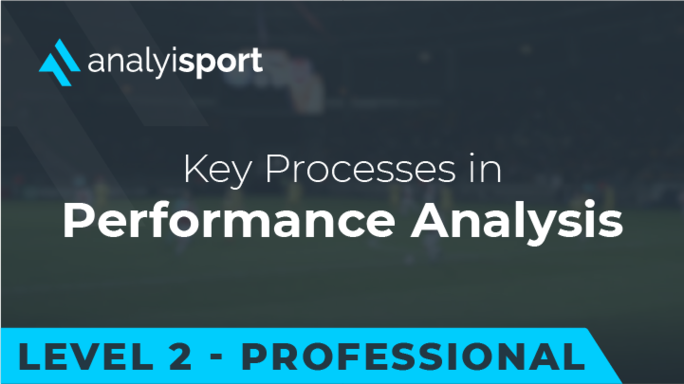
Building on the previous module, Level 2: Key Processes in Performance Analysis in Football introduces you to three of the key processes that analysts carry out at top clubs. The first is the work that analysts do in the academy to aid the development of talented young players. Next, you’ll see how analysis is used to improve outcomes on the training pitch. Finally, we look at post-match analysis and how to review a match and produce a report for the manager.

Our Level 1: What is Analysis in Football? module introduces you to the rapidly growing world of performance analysis. It’s a great place to start if you’re new to the subject. It looks at why clubs are spending so much on data and video technology, and why they need analysts to help them make the most of it.
“I can honestly say these were the best online courses I’ve done by a significant distance. I also spent £6k on a Master’s in Performance Analysis, and given my interest solely lied in football, that course taught me a fraction of what your courses did.”
- A Championship analyst
Sending an effective email -
If you going to apply for a position then sending an email is an important part of the application process.
You might also want to send an email out to someone to see if they have any jobs.
A lot of work gets done via email. But emails can be tricky. Unlike in a face-to-face conversation, in an email you can’t use body language, tone of voice or facial expressions to get your meaning across.
That’s why it’s so common for emails to cause misunderstandings.
So it’s important to make sure your emails are clear and helpful. Sending effective emails will not only save you time: it will showcase your communication skills and make all your colleagues’ lives easier.
AnalyiSport is the online training hub for football analysts
Our courses are created by expert analysts, to meet the needs of football professionals and students of the game.
Every course is:
- Created by expert analysts from the world's top leagues
- Packed with the latest insights
- Fully interactive so you can practice as you learn
- Accredited by the UK’s most established CPD body
- Available on demand, to fit your schedule
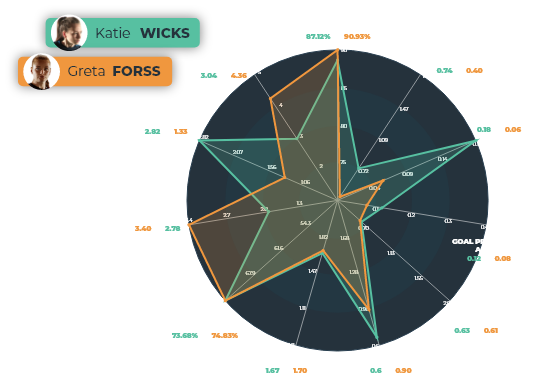
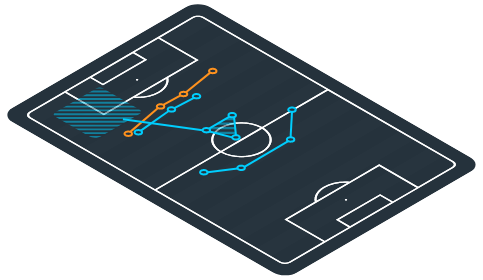
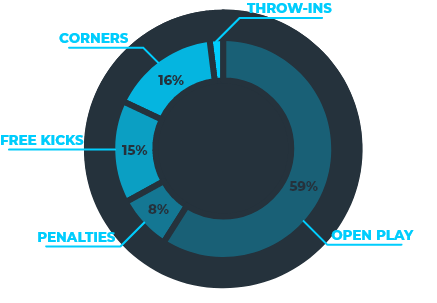
Related Football Insights
Our team provides news and insights from the cutting edge of football analysis.

